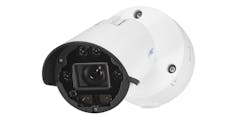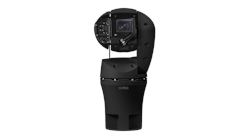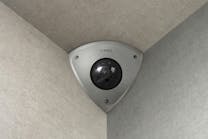Q&A: Locksmith Chuck Dixon
One reason that I conduct interviews with industry professionals in this column is to hopefully inspire readers to change something about the way they conduct their business, with the result being more profit and a business that runs more efficiently.
Chuck Dixon, owner of Evesham Lock and Safe in Marlton , NJ , is a guy who can help to accomplish this. Hopefully, this question-and-answer session with Chuck will help take a little bit of the fear and mystery out of the world of electronics and inspire some of you to move ahead where you may have hesitated to move before.
Chuck, the reason I chose to interview you is that you are locally renowned for your successful business and especially your knowledge and success in the world of access control and CCTV. How did you get started in our industry?
I got started in a cooperative education program where you go to school half a day and work the other half. I worked for Marty Arnold at Arnold 's Safe & Lock and it was neat because although I knew nothing about the industry, I was fascinated by it. I used to work in a fairly large retail department store and they would have the locks changed periodically to make it so people couldn't get in. By lunch time of the same day, everyone who wasn't supposed to have a key had one. I began to think that I'd like to be on the other end of things and help prevent that from happening.
So you saw this as a business opportunity for yourself?
Yes, because I saw theft happening as a result. Once I was on the job with Arnold 's for a week or two, I knew it was something I enjoyed doing.
How did you wind up with locksmithing through the work/study program?
When I decided on the program, the gentleman who ran it presented me with several job opportunities -- locksmith, auto parts warehouse, manufacturing -- and he thought this was a good fit for me. I knew of Arnold 's as having been in town for 30 years and a place to get those hard-to-find keys. Most people don't have everyday contact with a locksmith but I still knew about them and I liked that.
So you started working there in 1984; how did you spend most of your time at the beginning?
I did most of my work inside the shop which was good because in a busy shop you learn a lot quickly. You see A to Z; car locks, safe doors, etc.
What was your favorite part of the job back then?
I don't know that I had a favorite part but it was a variety of things that kept it interesting. One day I'd work on locks and safes; another day I'd spend reconditioning old safes. We did lots of auto work; removing door panels and ignitions and it was challenging with different models each time.
Was it as varied back then as it is now?
Even more so back then. Things have changed but not that much. Now you may have 20 different GM products using the same ignition where back then things were a little more varied.
Did you seek out information on your own?
Yes, I was very aggressive about learning. I would take home safe locks and manipulate them. Within four years I became a CML. The variety of things we dealt with help me to be able to do that.
There have always been a substantial percentage of locksmiths who didn't touch the electronic stuff. Why do you think that is?
I think some people are just afraid to attempt new things and don't seek out the knowledge.
As a locksmith I have to admit I fit into that category; I would replace strikes and that didn't require any great knowledge of electricity. Isn't it true that with a keypad you are just dealing with a switch?
Yes, a keypad with a relay that controls the flow of electricity to a device.
It sounds simple. Talk about the classes you've taught and why you think locksmiths tend to shy away from electronics.
I've taught classes on access control, CCTV and basic electronics as it relates to locksmithing. The biggest reason that people will give to explain why they don't do electronics is that they're afraid of it. It is fairly simple and if you get the proper training and take your time, you will be able to do it. Many are afraid to run wires but in actuality it's easier than drilling a door fresh to install a deadbolt.
How do we help the locksmith get over this hump?
I would suggest taking a class through a local association, and also many manufacturers of these products offer free training. When you do decide to purchase something, bench test it in your shop first and become comfortable with it. We still do this with 50 percent of what we sell and install. Once you've achieved a level of comfort with the product, you'll need to be able to get the wiring from point A to point B and effectively install any hardware you're using to lock and unlock the door.
Get yourself an electronics dictionary or study guide and make sure you understand things like Ohms law and other electrical principles and from there it's fairly simple. The companies who manufacture these products are there to help you as well.
Give me an example of how an understanding of Ohms law will help someone who's working with these products.
If you're supplying power to a series of devices, you'll want to make sure you're using a power supply with ample power. If you were using three magnetic locks and an electric strike on an installation, you'd need a ½ amp per item and then add 25 percent to that and you'd come up with a 2.5 amp power supply.
How much of your business today is electronic oriented?
I would say that about 70 percent of our business has to do with electronics, whether it's card access, CCTV and alarms and monitoring.
Why? Is it a by-product of enjoying it? Do you get a lot of referrals?
After being in the business for four years, I attended electronic/computer repair school to further my education. I could see it coming. In the 80s computers were evolving to the point where everyone had one. I actually started working in the computer industry and didn't enjoy it. I worked for a large company and I was just a number; they didn't care who I was. The way things worked I would just isolate the problem and then send it for repair. The way the locksmith business is you could be opening a car and after that opening a safe and after that maybe you're selling access control to someone. You get to meet different types of people and it gets interesting.
After that I was contacted by Lefebure, a large bank equipment company like Mosler and Diebold, to head up their Philadelphia region lock department. We serviced vault locks and banking systems like drive-ups and night depositories and anything that had to do with locking security in a bank.
Did you learn a lot there?
I already knew a lot from my past locksmithing experience but where I used to drill a safe deposit box once a month, now my department was responsible for hundreds each week. We serviced about 250 banks in New Jersey and Pennsylvania . We basically built banks from the ground up so I was exposed to CCTV, card access and some other electronic security things. I already had some electronics training and got an opportunity to apply it and that was valuable experience. There was too much travel involved and I decided to go into business for myself.
How did you approach this?
I did a little geographical study and saw that Marlton, NJ, was growing by leaps and bounds. I was fortunate because I had quite a number of referrals from my former bank work and sub-contracting work and that helped keep me going until I could advertise my services and network and let people know what we did here.
Did you have a good idea of what kind of work you'd focus on or were you feeling out the market?
This was around 1991 and I knew that locksmithing was going into electronic areas and if you didn't do it, you'd be missing the boat. Home Depots began to open up, selling locks for close to what we were buying them for. Home Depot happened to be a good thing for me because I met some people from their Loss Prevention department and I've been doing camera work for them.
Could you put yourself in the shoes of locksmiths who aren't benefiting from Home Depot's existence? How does it affect the lock part of your business?
It affects it quite a bit; it's also Lowes and other home centers doing locksmithing work. I knew that electronics was where the industry was heading. Mechanical locksmithing may pay your bills and one or two guys in your shop because they'll always be lockouts, etc.
I saw access control, security systems and cameras as a growing market. Once you're comfortable doing it, you have to let customers know that you do electronics. You have to market yourself.
How do you suggest doing that?
When you're at a building doing simple lock changes, make sure you plant the seed for the future by telling them you do these other things. Try aggressively advertising in the Yellow Pages, direct mailing and any other way to let them know you're not just a mechanical locksmith.
It's my opinion that you need to talk to people about the benefits of what you do and not just the features. Can you think of a situation where you may have turned an everyday locksmith job into a sale of something electronic by using this technique?
One of the biggest opportunities is controlling entry into a building at a certain time by authorized individuals. We often ask people if they want their employees to have keys and be able to have them copied. We take it to the next level and explain that with electronic solutions, there's no fooling anyone and it's going to log who they were, what door and what time so we can limit access to a door at certain times. When we learn about thefts that occur, we ask if they would like to have seen who did this and let them know we offer video camera installation and recording devices. You have to find the key person and let them know you can provide solutions to these types of problems.
What was CCTV technology like when you first began compared to what it is now?
We used to offer time-lapse VCRs. The cameras haven't changed much for the most part. Now we have some cameras with LEDs built in to help view better in total darkness. Many cameras now have what we call a ‘wide dynamic range' which helps to filter out light coming from the front as well as excessive backlight. We now have cameras that have a day/night feature where they switch from color to black & white when the light level goes below a certain LUX. We also have infrared illuminators which illuminate an area in total darkness.
Now it's all digital video recording with hard drives and more storage devices so we don't have to worry about changing tapes and it gives you much better quality pictures to view.
For the beginners out there, what is LUX?
LUX is a measurement of the actual light that is available and refers to the level at which the camera will no longer see objects.
How would you compare the cost/quality ratio to what it was in the past?
Well, cameras have come down in size and are relatively less in cost as well. Another saving occurs when a loss prevention person no longer has to view an entire tape for a given day to see an event; it can take hours or even weeks. Now with the use of a mouse or the push of a couple of buttons, you can simply select a time and bring video up for that particular time right away.
So any locksmith can offer these solutions. They need to study and learn and what else?
We go back to the bench testing of things. If it's video equipment, then buy something and set it up in your own shop and become familiar with its operation. This way you learn and have something to use to market the fact that you offer this as well. People who see it will ask you to come out and give them an estimate. Put a sign right next to it that says “We install video systems.”
Also keep in mind that video and access systems aren't used exclusively for security; it's also a management tool. A business owner might want to find out when employees are coming and going and he can do an audit control through his access system. One of the biggest areas of loss involves employees claiming they've worked more hours than they really did. With access and video systems, you can track this.
Is this a way you sell and market these systems?
Yes and we sell more enhancements on video systems by giving demonstrations to illustrate that it's more than just a security tool. Many video systems we sell give people the ability to view what's happening through the Internet. If the business owner is in Florida , he can log onto his computer and see what is happening and what's already happened.
Do you the day when mechanical solutions won't exist any more?
I see it occurring now. The 2006 and 2007 Corvette uses a proximity card that opens the car when you get close and allows you to start the car with the push of a button. The technology does exist and will spread to more models of cars over the next few years. Many homeowners already have push button electro-mechanical locks and there are biometric readers available for residential locks and new homes are being built with smart-home technology.
What new and exciting technology is out there?
I see more biometrics and iris identification to make sure of whom you are and that you're authenticated to enter. Some laptop computers have biometric security that won't allow you to use it without proper authentication.
No matter how high tech things get, are they are still just different ways to actuate a series of events that results in an opening?
Pretty much, these different readers just authenticate who you are so you can access something and they're triggering a relay or series of relays to either send power to a device to tell it to unlock, or taking power away and telling it to unlock.
Steve Kaufman
Steve Kaufman has worked for distributors in the locksmith industry since 1993 and worked as a full-time locksmith from 1978 through the 1980s. Kaufman is the sales manager for IDN Hardware out of its Philadelphia location.





